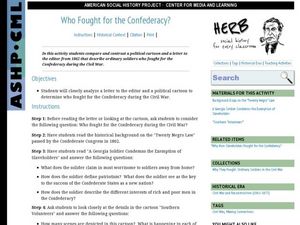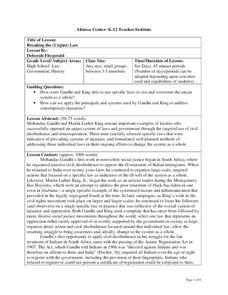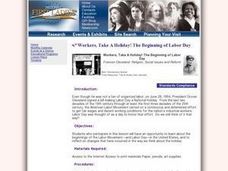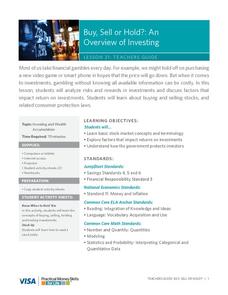Curated OER
1834 Poor Law
Students examine the 1834 Poor Laws. In this law lesson, students discover how the poor were cared for in the 1800's. Students gain knowledge about workhouses and the conditions there. Students view posters and discuss what they portray.
Curated OER
Module 13-Electronic Tax Return Preparation and Transmission
Learners explain the electronic preparation and transmission of tax returns. They describe the ways to prepare and transmit tax returns and explain the benefits of electronic tax return preparation and transmission.
Curated OER
What is Meant by Returning to Fundamental Principles?
What did the Founding Fathers mean by the importance of continually returning to fundamental principles? Your young historians will analyze a series of quotations illustrating the fundamental ideals and principles of the United States...
Curated OER
How an Idea Becomes a Law
Students create posters that demonstrate the step-by-step process of how ideas become laws. They list the fourteen steps of a bill becoming a law, describe a presidential veto, and define override.
Curated OER
Hong Kong: Law to Ban Criticism of China
Students compare the governmental policies of Hong Kong before and after returning to the People's Republic of China. They describe and analyze the "Basic Law 23" of Hong Kong statutes and its effect on Hong Kong's political and economic...
US House of Representatives
Keeping the Faith: African Americans Return to Congress, 1929–1970
New ReviewThe third lesson in a unit that traces the history of African Americans serving in the US Congress examines the period from 1929 through 1970. After reading a contextual essay that details the few African Americans elected to Congress...
Curated OER
Decision Making: Who Was Right?
Help your class explore the question "Is it ever right to disobey a law?" With a strong base of knowledge about the Civil War, anti-slavery movement, and Underground Railroad, your class explores civil disobedience in Marshall, Michigan...
Curated OER
Who Fought for the Confederacy?
Did the Confederate Army really consist of southern volunteers? Using primary sources, historians examine the story behind the "Twenty Negro Law" and realities of conscription during the Civil War. A letter and a lithograph (included as...
iCivics
Congress
Through reading materials, worksheets, and a primary source activity, this resource provides an overview of the structure and powers of the legislative branch of government in the United States. Readings review how a bill becomes a law,...
Curated OER
Breaking the Unjust Law
Students consider the concept of civil disobedience. In this lesson on changing unjust laws, students use primary sources to understand how Gandhi and King changed the law. Students will then list laws that they feel are unjust and plan...
Curated OER
Due Process of Law and the Jim Crow Era
High schoolers analyze eight case studies of Supreme Court decisions regarding due process of law and their impact on American society in the early 20th century. They digest that although the 14th amendment was intended to give federal...
Curated OER
4th grade social studies review
In this geography instructional activity, 4th graders answer multiple choice questions about laws, Native Americans, geography, and more. Students complete 25 questions.
DocsTeach
Alfred Sinker and the Writ of Habeas Corpus in 1861
Scholars learn how the judicial system treated under-age Civil War soldiers using historical analysis. The resource uses court documents to help historians understand why Habeas Corpus was used in the case of Alfred Sinker and why he was...
Curated OER
Technology, R&D, and Efficiency
For use in conjunction with the 2002 McGraw-Hill/Irwin US Economics text, this presentation highlights key points and important vocabulary. Specific economic concepts and theories, R & D expenditures, rate-of-return curve and...
Center for Civic Education
What Does Returning to Fundamental Principles Mean?
Looking for materials for your Constitution Day and Citizenship Day lessons? Then check out this packet of activities that not only gets your class members thinking critically about the fundamental principles at the heart of American...
Curated OER
Jaywalking
Students study the consequences of breaking laws. They role-play jaywalking and what could happen if they participate in this behavior.
Curated OER
Arrest- A Legal System Simulation
What would your class do if a police officer arrested a student in class? This is exactly the anticipatory set that gets students engaged in a unit on the legal system. The plan is to get the officer to simulate an arrest, and then guest...
Curated OER
Arrest
Young scholars become active participants in the legal process as they take on the roles of witnesses, jurors, and defendants in a trial simulation. An understanding and appreciation of the legal system is fostered through the experience.
Curated OER
Diminishing Returns
Students play an economics game to learn about the law of diminishing returns. The lesson can be used to link to other concepts. The difference of production and productivity is explored.
Curated OER
The Rising Cost of Health Care: Is there an explanation?
Twelfth graders explore rising health care costs and the Law of Diminishing Marginal Utility. They participate in an activity that demonstrates the Law of Diminishing Marginal Utility. Students read the may 27, 2005 Economic Letter and...
EngageNY
Reading and Taking Notes on Colonial Trades
In the tenth instructional activity of this unit, young scholars learn to categorize information as they continue researching their colonial trade. During guided practice, the teacher models how to read informational text slowly while...
Curated OER
Levi Coffin on Trial
Students are introduced to Quaker beliefs about slavery and actual statements of conviction about slavery by Levi Coffin. They explore the federal laws about returning escaped slaves, specifically the Fugitive Slave Act of 1850
National First Ladies' Library
Workers, Take a Holiday! the Beginning of Labor Day
When your upper elementary class returns in the fall, have them identify and define the beginnings of the labor movement and Labor Day in the United States. They thoughtfully reflect on changes that have occurred in the way we think...
Visa
Buy, Sell or Hold?: An Overview of Investing
Break down the often-daunting topic of the stock market with this resource, in which pupils learn basic terminology regarding buying and selling stocks, as well as the factors that influence how much return individuals can receive on...

























